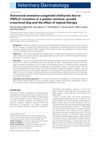Advances in the Treatment of Autosomal Recessive Congenital Ichthyosis: A Look Towards the Repositioning of Drugs
November 2023
in “
Frontiers in pharmacology
”

TLDR Drug repositioning offers hope for new, affordable treatments for a genetic skin disorder called ARCI.
The document discusses Autosomal recessive congenital ichthyoses (ARCI), a genetic skin disorder characterized by scaling and redness, which significantly impacts patients' quality of life. While topical treatments are commonly used for their convenience and affordability, oral retinoids are more effective but come with limitations. Since ARCI is a lifelong condition, there is a continuous need for new treatments. The review highlights drug repositioning as a promising approach to develop new, cost-effective therapies for ARCI by leveraging existing knowledge of drugs and biologics, potentially offering more accessible treatment options for patients.





